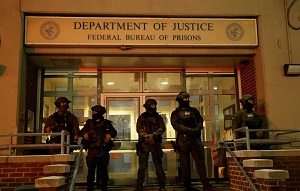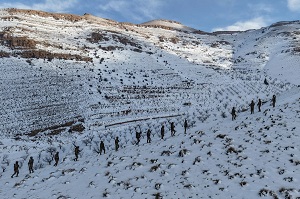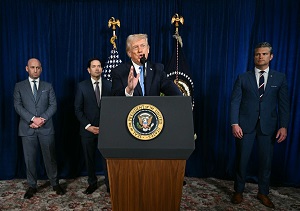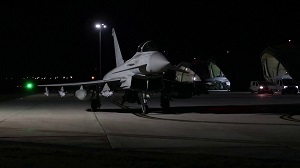Trump Revealed Highly Classified Intelligence to Russia, in Break With Ally, Officials Say

nytimes -
By MATTHEW ROSENBERG and ERIC SCHMITTMAY
President Trump met with Sergey V. Lavrov, Russia’s foreign minister, in the White House last week. American journalists were barred, but Russia released photographs. Credit Russian Foreign Ministry
WASHINGTON — President Trump boasted about highly classified intelligence in a meeting with the Russian foreign minister and ambassador last week, providing details that could expose the source of the information and the manner in which it was collected, a current and a former American government official said Monday.
The intelligence disclosed by Mr. Trump in a meeting with Sergey V. Lavrov, the Russian foreign minister, and Sergey I. Kislyak, the Russian ambassador to the United States, was about an Islamic State plot, according to the officials. A Middle Eastern ally that closely guards its own secrets provided the information, which was considered so sensitive that American officials did not share it widely within the United States government or pass it on to other allies.
Mr. Trump’s disclosure does not appear to have been illegal — the president has the power to declassify almost anything. But sharing the information without the express permission of the ally who provided it was a major breach of espionage etiquette, and could jeopardize a crucial intelligence-sharing relationship.
In fact, the ally has repeatedly warned American officials that it would cut off access to such sensitive information if it were shared too widely, the former official said. In this case, the fear is that Russia will be able to determine exactly how the information was collected and could disrupt the ally’s espionage efforts.
Continue reading the main story
The Trump White House
The historic moments, head-spinning developments and inside-the-White House intrigue.
How Government Secrets Are Declassified and Disclosed
MAY 15
Texas Seeks Medicaid Money It Gave Up Over Planned Parenthood Ban
MAY 15
Before Trump’s Visit to Israel, Small Issues Prove Thorniest
MAY 15
Trump to Expand Funding Ban Tied to Abortion Overseas
MAY 15
Trump, About to Visit Saudi Arabia, Is Urged to Help Yemen
MAY 15
See More »
Related Coverage
How Government Secrets Are Declassified and Disclosed MAY 15, 2017
With Awkward Timing, Trump Meets Top Russian Official MAY 10, 2017
Trump Bars U.S. Press, but Not Russia’s, at Meeting With Russian Officials MAY 10, 2017
Trump Finds Respite at Liberty University as Aides Interview F.B.I. Candidates MAY 13, 2017
Trump Warning to Comey Prompts Questions on ‘Tapes’ MAY 12, 2017
The Washington Post first reported Mr. Trump’s disclosure. White House officials denied that Mr. Trump shared sources and methods of intelligence gathering but did not address whether he talked about the Islamic State plot itself.
Beyond angering a partner and calling into question the ability of the United States to keep secrets, the episode threatened to overshadow Mr. Trump’s first trip abroad as president. He departs on Friday for Saudi Arabia, Israel, Italy and Belgium.
The revelation also opens Mr. Trump to criticism of a double standard. The president made Hillary Clinton’s mishandling of classified information through her private email server central to his campaign, leading chants of “lock her up” at rallies. But there was never any indication that Mrs. Clinton exposed sensitive information from an ally or gave it to an adversary.
Crooked Hillary Clinton and her team "were extremely careless in their handling of very sensitive, highly classified information." Not fit!
— Donald J. Trump (@realDonaldTrump) July 6, 2016
It was also likely to intensify scrutiny about Mr. Trump’s dealings with Russian officials. He showed throughout his campaign, and at times during his presidency, an unusual willingness to praise President Vladimir V. Putin of Russia and has dismissed as “fake news” the conclusion of the American intelligence community that Russia interfered with the presidential election. He has also expressed frustration with the continuing Justice Department investigation into Russia’s meddling and whether any of the president’s associates aided Moscow’s effort.
It was not clear whether Mr. Trump wittingly disclosed such highly classified information. He — and possibly other Americans in the room — may have not been aware of the sensitivity of what he was sharing. It was only after the meeting, when notes on the discussion were circulated among National Security Council officials, that it was flagged as too sensitive to be shared, even among many American officials, the former official said.
The Trump administration pushed back on the revelation, with high-ranking officials issuing carefully worded denials, insisting that the president did not discuss intelligence sources and methods or continuing military operations that were not public.
“I was in the room — it didn’t happen,” Lt. Gen. H. R. McMaster, Mr. Trump’s national security adviser, said in an appearance outside the West Wing, which was sent into chaos on Monday afternoon by reports that the president had disclosed extremely sensitive information about an Islamic State plot.
“At no time — at no time — were intelligence sources or methods discussed, and the president did not disclose any military operations that were not already publicly known,” General McMaster said.
He said his account and those of others who were present for the meeting should outweigh those of unnamed officials who have said the president jeopardized national security.
Secretary of State Rex W. Tillerson echoed General McMaster’s denial that sources or methods were discussed, though he did say that Mr. Trump talked about “the nature of specific threats” in the meeting.
But according to the officials, Mr. Trump discussed the contents of the intelligence, not the sources and methods used to collect it. The concern is that knowledge of the information about the Islamic State plot could allow the Russians to figure out those details.
In fact, the current official said that Mr. Trump shared granular details of the intelligence with the Russians. Among the details the president shared was the city in Syria where the ally picked up information about the plot, though Mr. Trump is not believed to have disclosed that the intelligence came from a Middle Eastern ally or precisely how it was gathered.
General McMaster did not address that in naming the city, in Islamic State-controlled territory, Mr. Trump gave Russia an important clue about the source of the information.
Like the United States, Russia is also fighting in Syria, where it has stationed troops and aircraft. The two countries share some information, but the cooperation is extremely limited, and each has widely divergent goals in the civil war there.
Russia’s primary focus has been propping up the government of the Syrian president, Bashar al-Assad, not directly battling the Islamic State. The United States, in contrast, views the Islamic State as the primary threat, and is aiding rebels who are fighting both the Islamic State and the Syrian government.
Before The Post’s article was published, its impending publication set off a mild panic among White House staff members, with the press secretary, Sean Spicer; the deputy press secretary, Sarah Huckabee Sanders; and the communications director, Mike Dubke, summoned to the Oval Office in the middle of the afternoon.
Jared Kushner, the president’s son-in-law and one of his advisers, was not in the meeting. But internally, Mr. Kushner criticized Mr. Spicer, who has been the target of his ire over bad publicity for the president since Mr. Trump fired the F.B.I. director, James B. Comey, last week.




